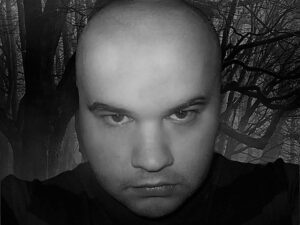A Point of Pride: Interview with L. Stephenson

Out to his family and friends since he was sixteen, L. Stephenson’s short stories and poetry have been haunting horror anthologies and online magazines since 2018, the best of which can be found in his recently-released mini collection, Candles, Bullets, & Dead Skin. Graduating university in 2010 with a degree in Film & TV Screenwriting, Stephenson released his first novella, The Goners in 2021. Originally the beginning of a trilogy that has now fused into his debut slasher novel, The Boatmore Butcher, due out in September of this year through Dark Ink Books.

What inspired you to start writing?
I was just fascinated by books as a child. I loved everything about them: the lettering, the feel of a page, the cover, the smell. The dream was to have a book of my own one day, clasped between my hands.
What was it about the horror genre that drew you to it?
It started at a very young age, all because of the colour purple. It was my favourite colour and was very prominent in the design of some of the most popular villains, from Ursula in The Little Mermaid and Maleficent in Sleeping Beauty to the Joker from Batman. And even though the colours changed, my interest in evil fictional characters only got stronger and darker as I grew older.
Do you make a conscious effort to include LGBTQ material in your writing and if so, what do you want to portray?
It would be more accurate for me to say that I don’t make a conscious effort to not include LGBTQ material in my writing. As with any character I create, I will portray them however I choose.
What has writing horror taught you about the world and yourself?
That the world is a much scarier place than anything I will find in a book, and I will live longer if I continue to respect that!
How have you seen the horror genre change over the years? And how do you think it will continue to evolve?
I’ve always been out of step with what others are doing. However, I’ve felt that more and more writers are following movie trends, with grief and trauma seeming to be the most current. But like all trends, eventually people will move on to the next big thing. Meanwhile, the lean towards realism will probably continue to intensify, especially in the wake of the countless true crime documentary series that are out there.
How do you feel the LGBTQ community has been represented thus far in the genre and what hopes do you have for representation in the genre going forward?
In my experience, I have found the community to be greatly underrepresented, but have noticed some very promising acceleration in recent times. I hope that the state of things will keep advancing until our presence in the genre is normalized.
Who are some of your favorite LGBTQ characters in horror?
There aren’t many LGBTQ characters in horror that I have felt a connection to. But if I had to pick one, it would be Evil Ed from 1985’s Fright Night, played by Stephen Geoffreys.
Who are some LGBTQ horror authors you recommend our audience check out?
If, for whatever reason, you haven’t checked him out already, Clive Barker.
What is one piece of advice you would give horror authors today?
Outside of promoting your own work, or helping promote the work of others, spend as little time on social media as you can. Just as you pour your darkness into your writing, there are some sad, sad people out there who flood their posts with their own darkness in the hopes of a little attention by directing it at others. Don’t waste your time on the words of a boring person desperate to be visible.
And to the LGBTQ writers out there who are just getting started, what advice would you give them?
Write what you want to write. Don’t feel obligated to “carry the torch” for the community if that’s not what you want to do with your work.



